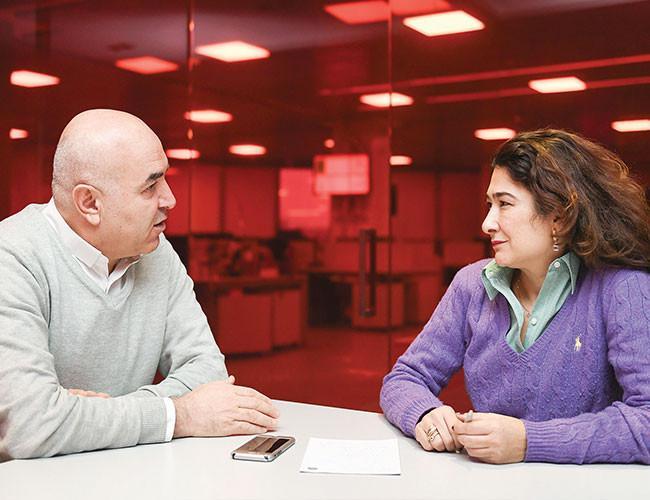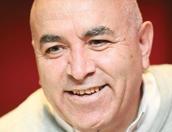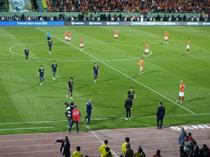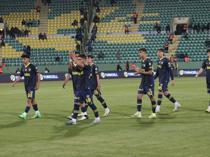Foreign players have transformed Turkish league into ‘most competitive in Europe’: Journalist
Barçın Yinanç - barcin.yinanc@hdn.com.tr

The rise in the number of foreign players has turned the Turkish Super League into the most competitive in Europe, according to Hürriyet’s chief sports editor Mehmet Arslan, citing the fact that at least five teams are still considered title contenders at the start of the second half of the season this week.
Arslan, who is Hürriyet’s chief sports editor, also told the Hürriyet Daily News that foreign players have “started to change the football culture in Turkey.”
Tell us about this season in the Super League. It is said to be one of the most competitive seasons in the league’s history.
That’s definitely true. I don’t follow all the leagues around the world, but I can say that the Turkish Super League is the most competitive in Europe at the moment. The champion of the English Premier League is already more or less known, as in Spain’s La Liga and Germany’s Bundesliga. But in Turkey, in addition to the “big three” of Beşiktaş, Fenerbahçe and Galatasaray, there is also Başakşehir and Trabzonspor that believe they are in with a shout.
What has changed?
The Turkish Super League has started to witness an extraordinary transformation. The main reason for this is the foreign players, who have brought a culture of higher quality to the country. We used to see the Super League as a platform in which to develop players for the Turkish national team. But that was a fundamental mistake. The English Premier League has no such mission and neither does La Liga. The Super League’s rival should not be the Serbian national team, it should be the Premier League.
With the decision on foreign player numbers, taken by the Turkish Football Federation in 2015 and raising the limit to 14, the Super League has become an arena worth watching. In every team there are at least five or six foreign players who are also playing in their national teams. This is reflected in matches and scores, and we have ended up with a league where any team can beat any other team. That is largely thanks to foreign players, who are changing and transforming us.
But don’t the “big three” have considerable advantages compared to smaller Anatolian clubs in terms of signing better players?
The “big three” actually have a big disadvantage in terms of transfers. They are so popular that they are under huge pressure from their fans and the media, meaning that they constantly feel the need to transfer popular players. Anatolian teams, on the other hand, have started to earn serious money thanks to the increase in broadcasting income and have thus become able to make some serious transfers. They have no media or fan pressure either, allowing them to take a wider vison. For example, Alanyaspor has been able to sign a world star like Wagner Love, and Antalyaspor has been able to bring in world stars like Samir Nasri and Samu Eto’o.
How are foreign players changing Turkish football?
In the past we often wanted foreign players or managers to come to Turkey so that they could improve our football. But on the contrary we started to change them. Back when there were two, three or four foreign players in a squad it was easy to change them. But now there can be as many as 14 foreign players in a squad and it not so easy. So they have started changing our football culture. A veteran player like Emmanuel Adebayor, currently at Başakşehir, recently spoke out to say athletes do not work out enough in Turkey.
We are a country that looks for excuses in football. Either the fault lies with the referee, or it lies with the pitch conditions, or it lies with the Turkish Football Federation. But that is not the case for foreign players, who can take a more objective look. They can bring that self-criticism.
Last week I interviewed academic Deniz Ülke Arıboğan, who suggested that the concept of global citizenship of the post-Cold War liberal world order is no longer popular. She noted that every country, including Turkey and the U.S., is making calls for “local and national” production. This seems to not apply to football.
That is why football is so popular, it belongs to all of us and it is global. Today, Beşiktaş does not constantly have to say “local and national.” It is trying to attract supporters from the Far East and from the Middle East. If you say “local and national” in football then you can remain only “local and national.” You cannot become internationally successful. I don’t believe successful football can have a “local and national” spirit.
Many politicians have criticized the high number of foreign players this season.
Nationalist Movement Party [MHP] head Devlet Bahçeli spoke about this after Galatasaray went onto the field with 11 foreign players. President Recep Tayyip Erdoğan has also hinted about decreasing the number. But if you say “local and national” football then you will end up with a dull game without competition or excitement, which no one would be interested in or willing to invest in. You cannot confine football by fitting it into a national uniform.
But there is also criticism that Turkish football clubs are paying tremendous amounts of money for stars who are looking for a lucrative payout at the end of their careers.
True. Until recently Turkey was the last stop before Qatar. It was the final stop in the careers of many stars. The reason why few in the prime of their career have wanted to come is that firstly the Turkish Super League is less well known than many leagues. The reason why Cenk Tosun was recently bought by Everton was not so much because of his success in the Turkish league but because of his success in Champions League. Second, geography is another unfortunate factor. Foreign players look at Turkey’s map and see war across the border in the south. So they ask for more money.
But looking at the advantages for foreign players, Turkish clubs tend to make more concessions to try to entice them here, for example paying for their house and car. Most importantly there is a tax advantage, as footballers earn a net income.
What about the culture of fans? Will there be change there too? It seems that at the moment all they want is to win, at any cost.
A: There are couple of reasons behind this attitude. First there is the behavior of the players on the pitch. Turkish players often see no problem in deceiving their competitors, the referee, or the fans. This is a moral problem. We need to integrate moral values into sports, starting from players but extending to coaches, executives, journalists and pundits. They all feed this fanaticism at the moment.
Unfortunately, Turkey is not a country that has a strong or deep-rooted sports culture. The average age of football stadiums here is just 1.7 years, which is a world record. There is no other country in the world with so many newly built football stadiums. So we have started to secure excellent facilities, but where are we going to find the spectators to fill these stadiums? That is about education. Currently in the Turkish curriculum physical education is limited to two hours per week. We need to change this.
Stadiums have been empty for some time.
The July 2011 scandal [in which Fenerbahçe officials were arrested in a match-fixing scandal, later revealed to be a plot hatched by the movement of U.S.-based Islamic preacher Fethullah Gülen] dealt a heavy blow to Turkish football. After it stadiums started to empty out. People already knew that football was dirty but now this was revealed directly.
Another important factor that has stopped many people going to matches is the introduction of the controversial Passolig ticketing system in 2015. I am in favor of electronic tickets, but with Passolig you have to make an upfront payment to a designated bank before you even become eligible to buy a ticket. This has turned many people off.

WHO IS MEHMET ARSLAN?
Born in Karahallı , a district in the Aegean province of Uşak, Mehmet Arslan went to school in Kütahya before graduating from Marmara University’s Faculty of Journalism in İstanbul. He started his career in journalism while in university, working as a sports editor in daily Bulvar.
Arslan has been working in daily Hürriyet for the past 28 years. He has been the newspaper’s chief sports editor for the last 10 years, covering the Olympics, football World Cups, and World Athletics Championships.
Arslan has several times received journalist of the year awards from professional institutions like the Turkey Sports Writers Association and the Turkish Journalists’ Association, and today he frequently appears as a pundit on TV sports programs.
















